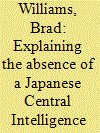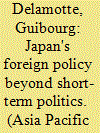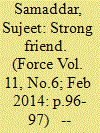| Srl | Item |
| 1 |
ID:
120591


|
|
|
|
|
| Publication |
2013.
|
| Summary/Abstract |
I examine a relatively underexplored aspect of Japan's early postwar history and seek to explain why attempts to establish a Japanese-style central intelligence agency (JCIA) in the 1950s were unsuccessful. I evaluate three competing explanations drawn from the level of international politics, focusing on US power resources and influence as well as liberal and constructivist styles of analysis-alliance politics, sectionalism, and the norm of antimilitarism-in order to shed light on the historical origins of Japan's intelligence apparatus, which is relatively underdeveloped and underfunded compared to other middle powers. It highlights the primacy of domestic factors over structural causes in explaining the decision not to establish a JCIA. In particular, I argue that the JCIA proposal failed primarily because of attacks on important proponents that, while sometimes driven by seemingly rational organizational interests, were nevertheless legitimated by growing antimilitaristic sentiments shared by elites from the political center to the left of the ideological spectrum. The newly emerging norm of antimilitarism was predicated largely on a fear of constraints on recently acquired civil and political liberties. These fears, manifested most prominently in vocal Diet and media opposition, were compounded by the norm of secrecy-an important element of intelligence activities-which served to heighten further speculation about the malign intent of postwar Japan's reconstituted intelligence system.
|
|
|
|
|
|
|
|
|
|
|
|
|
|
|
|
| 2 |
ID:
126401


|
|
|
| 3 |
ID:
126858


|
|
|
| 4 |
ID:
116290


|
|
|
|
|
| Publication |
2012.
|
| Summary/Abstract |
In August 2009, the Liberal-Democratic Party (LDP), which had been in power since 1955, lost the general elections to a recently-formed party, the Democratic Party of Japan (DPJ). The LDP's foreign policy had placed emphasis on relations with the US, and on international cooperation and relations with Asia. The LDP's foreign and defense policy lacked a long term vision; it was incremental, pragmatic and could be described as reactive or passive. An examination of the DPJ's foreign policy, three years after its coming to power, reveals that it has accepted part of the LDP's inheritance. The Japan-US Alliance was reasserted as pivotal to Japan's security. Cooperation with Asia has not given birth to a new regional structure or to new institutional mechanisms, and dialogue with China has not improved; incrementalism is still preferred in the field of defense. Nonetheless, the fact that Japan's opposition is now a catch-all party at the center of the political scene changes the framework of foreign and defense policy-making considerably. Therefore, the likelihood of interpartite cooperation over foreign and security policy is theoretically conceivable. Nonetheless, political and institutional constraints to change in the field remain.
|
|
|
|
|
|
|
|
|
|
|
|
|
|
|
|
| 5 |
ID:
129899


|
|
|
|
|
| Publication |
2014.
|
| Summary/Abstract |
This article analyzes the most recent phase of Japan's security policy reform, focusing on its shifting priorities towards the Japan Self-Defense Forces and the Japan-US alliance since mid-2010. From a realist perspective, it argues that these shifting military priorities first and foremost represent a traditional counterbalancing response to China's rise. Conforming to the logic inherent in balance of threat theory, it moreover argues that this balancing behavior is explained by a confluence of two primary factors, namely Japanese perceptions of aggressive Chinese behavior in the maritime domain and concerns relating to the changing distribution of capabilities in China's favor.
|
|
|
|
|
|
|
|
|
|
|
|
|
|
|
|
| 6 |
ID:
128679


|
|
|
| 7 |
ID:
002038


|
|
|
|
|
| Publication |
Washington, D C, National Defence University Press, 1983.
|
| Description |
viii, 68p.
|
| Series |
National Security Affairs Monograph Series; 83-7
|
|
|
|
|
|
|
|
|
|
|
|
Copies: C:1/I:0,R:0,Q:0
Circulation
| Accession# | Call# | Current Location | Status | Policy | Location |
| 022992 | 355.0310973/REE 022992 | Main | On Shelf | General | |
|
|
|
|